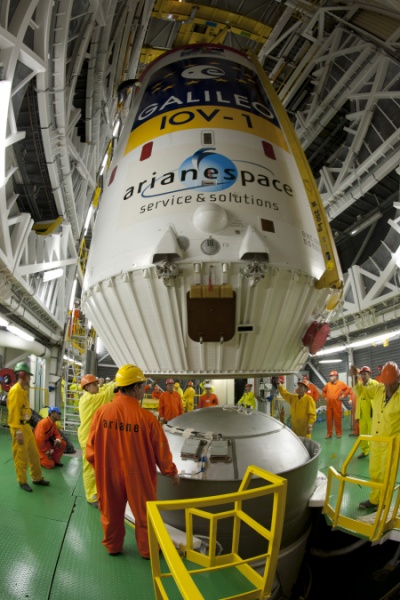Galileo satellites set for Soyuz-powered lift-off

The first two operational satellites for the EU's Galileo constellation are set to launch into space on Thursday from the European Spaceport in Kourou, French Guiana.

The first two operational satellites for the EU's Galileo constellation are set to launch into space on Thursday on a Soyuz rocket. Photo credit: ESA/S Corvaja
The launch is scheduled for 11:34am BST. The satellites will be taken to a 23,600km-high orbit aboard a Soyuz rocket, marking the first time one of Russia's workhorses will have lifted off from Western territory.
On Monday, the European Commission said the global navigation satellite system (GNSS) will "deliver €60bn [£52bn] to the European economy over 20 years in additional revenues for industry and public and social benefits, not counting the benefit of technological independence".
Galileo will be a major rival to the US's Global Positioning System (GPS) constellation, which is the GNSS used in the vast majority of satnav devices and smartphones. While GPS use is for the most part freely available to all, it remains under the control of the US government.
A few other countries also have their own alternatives — Russia has recently been revamping Glonass, while China has a regional system called Beidou that it intends to take global in the form of a new system called Compass.
Galileo will offer five types of service: public satellite navigation, an encrypted commercial service, search and rescue, an emergency and security-focused Public Regulated Service (PRS), and a 'safety-of-life' service that augments the standard open service by warning the user when the integrity of the signal is not up to scratch.
The two satellites set to go up this week are called Thijs and Natalia, named after children from Belgium and Bulgaria respectively who won drawing competitions. Kids from the other 25 member states will also have the chance to see their names attached to the remaining satellites, the deployment of which will run until 2019. There will be 30 satellites in total.
The European Commission admitted on Monday that "the Galileo programme got off to a slow start", as its development was first authorised back in 1999 and the various EU administrative bodies only agreed full funding in 2008. In 2009, the Commission's own auditors strongly criticised the project for running over budget and deadline.
Although the budget for Galileo was initially set at around €1.8bn, the final tally is likely to be more than €5bn.
Get the latest technology news and analysis, blogs and reviews delivered directly to your inbox with ZDNet UK's newsletters.